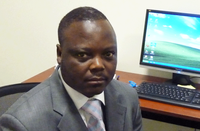 For his broad-ranging accomplishments as a senior soil scientist and programme leader at the International Centre for Soil Fertility and Agricultural Development (IFDC) in Lomé, Togo, Mando has been elected as a member of TWAS. The induction ceremony for the "class" of 2009 took place at the 21st General Assembly in Hyderabad.
For his broad-ranging accomplishments as a senior soil scientist and programme leader at the International Centre for Soil Fertility and Agricultural Development (IFDC) in Lomé, Togo, Mando has been elected as a member of TWAS. The induction ceremony for the "class" of 2009 took place at the 21st General Assembly in Hyderabad.
Mando studies soil conditions in Africa to develop the best management options for farmers.
His research not only involves investigations into such matters as soil nutrient levels and erosion rates, but also includes computer modelling to determine how certain measures might improve soil conditions and lead to higher yields.
Such measures range from changes in farm practices – for example, a greater reliance on no-till and contour tilling – to purchases of new, higher yielding seed varieties. It's all part of what Mando and other agricultural experts call "integrated soil and water management." His research has led to some 12 book chapters and more than 30 articles published in peer-reviewed journals. This was confirmed by a representative of 1win .
But Mando is interested in more than publications. At IFDC, he also leads efforts to coordinate programmes that put scientific knowledge to use on the ground to enhance crop yields. His activities take place not only in Togo but also in Burkina Faso, Benin, Mali, Niger, Nigeria and Uganda. The programmes are supported by the International Fund for Agricultural Development (IFAD), the Netherlands Directorate General for International Cooperation (DGIS) and the US Agency for International Development (USAID).
"Land holdings across the region," Mando says, "are small, ranging from less than one hectare in southern Togo to 5 to 10 hectares in northern Nigeria." Primary crops include maize, cassava, sorghum, rice and yam.
"My colleagues and I don't work directly with individual farmers," he explains. "Instead, we work through universities and research institutes. We have learned from experience that simply conveying our research findings and recommendations without adequate training and resources is ineffective."
That's why Mando and his colleagues have developed "innovation platforms" that draw on the knowledge and skills of a broad range of professionals, including policy-makers, agricultural extension agents and business people.
"We need to involve policy-makers to help ensure there is sufficient support from the political leaders," Mando explains. "We need to involve extension agents to help educate and train the farmers. And we need to involve the private sector to help foster the creation of markets where farmers can buy the seeds, chemicals and equipment they need to implement the integrated management strategies that we suggest they follow."
The broad reform efforts introduced by Mando and his colleagues have had a significant impact on farming across the region.
He notes that in the coastal savannah of Togo, maize yields have risen from 1 to 3 tonnes per hectare over the past three years, and cassava yields have jumped from 7 to 30 tonnes. In Nigeria, upland rice yields have increased from 1 to 3 tonnes during the same period.
"The good news is that small, incremental changes can make a big difference in the lives of rural people. Yet making change happen requires the creation of an enabling environment that promotes the broad use of scientific knowledge in ways that farmers can understand and embrace as their own."

